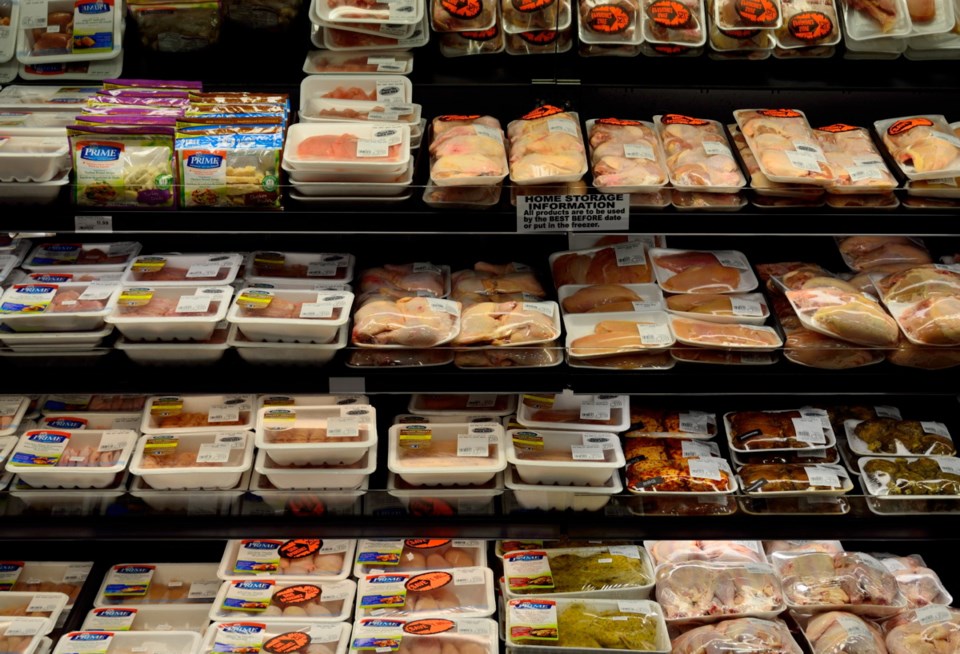Food fraud — from horse meat masquerading as hamburger to rice made from plastic — is a huge, organized, world-wide criminal activity, says a Victoria-raised science author of a new book on the practice.
U.K.-based Nicola Temple, co-author along with Richard Evershed of Sorting the Beef from the Bull, says food fraud — using labels that lie or manufacturing outright impostors — is now a multimillion-dollar business.
“We don’t really have good estimates of how much of this is happening, how vulnerable our food is to crime,” Temple said. “But it’s huge.”
Temple, 42, a biologist who attended high school in Sooke and later studied biology at the University of Victoria, has been living in Bristol, England for the past five years with her biologist husband, also trained at UVic.
She is scheduled to speak at the University of Victoria on May 27, launching her book in North America.
Temple said she first encountered food fraud years ago when British supermarkets started yanking corn oil from the shelves, after it was found to have been adulterated with cheaper (in Britain) canola oil.
Her co-author, Evershed, a bio-geo chemist, developed a test based on the carbon isotopes in canola and corn oil to determine the concentrations of the different oils, and went on speaking tours discussing his method.
But Temple said the book really got going in 2013, when the U.K. was gripped by a scandal the tabloids soon called “Horsegate.”
DNA testing had revealed that a popular brand of pre-formed hamburgers and packaged lasagna contained horse meat, although its label claimed beef. It also contained pork, a religious hazard for some. But it was the horse meat that proved most controversial.
When authorities looked into the horse meat/hamburger issue, it became obvious the fraud was made possible by the meat’s convoluted pathway to market. Horses were moved around, killed in one spot and butchered in another.
“It was astonishing how many hands were in the food-supply chain of that particular network,” said Temple.
Public disgust and bad publicity soon led the British government to form the National Food Crime Unit.
But Temple said she was even more horrified when she began looking at food fraud around the globe.
Milk, for example, is frequently watered down, but in some cases, it is outright counterfeited.
For example, milk being sold in India has been found to have been formed from shampoo, oil and urea, frequently used as a fertilizer. In China in 2008, baby formula made from melamine, used in certain paints, killed six infants and sickened 300,000.
Temple said urea and melamine are both high in nitrogen, the chemical tested for when food’s protein content is analyzed.
“You think: ‘Wow, people are doing this to make a buck knowing full well it’s going to get fed to children,’ ” she said.
Rice, a staple across Asia, is targeted for all kinds of fraud. An easy one is to sell cheap long-grain rice as basmati in India. But grains have even been found to be formed from plastic resin, dust and all manner of starch products.
Even eggs have been counterfeited, using substances such as sodium alginate (a stabilizer used to make cheese) or calcium chloride (a de-icing compound), with shells formed from gypsum (found in drywall) and paraffin.
“I have spent many an evening trying to replicate the process and have got the yolk and the egg white,” said Temple. “But the shells have always been beyond me.
“But they can pump out a lot more fake eggs than a chicken can make real ones,” she said. “And it’s about one third of the cost.”
Temple said she doubts whether there would be much of a market in Canada for counterfeit eggs or plastic rice. But she pointed out fish species are regularly mislabelled. It’s usually explained or dismissed as a genuine mistake. But Temple said she finds it significant that incidents of incorrect labelling invariably involve a cheaper variety being passed off as a more expensive one.
Spices, too, are regularly bulked up with nut products, a hazard for anyone with a nut allergy.
Meanwhile, Temple said, agencies such as the Canadian Food Inspection Agency focus most of their effort on disease-causing contamination such as salmonella, and rightly so.
But she said consumers shouldn’t feel helpless. She advised getting to know your grocers and choosing ones you trust will respond to your concerns.
Buy in bulk and buy unprocessed, she suggested. Buying spices that you grind at home lessens the chances of strange additives.
They also taste better.
Another tip Temple offers is to buy local, since the fewer hands your food passes through on the way to market, the fewer the opportunities for fraud.
She also advises learning which foods are in season, since you’re less likely to be fooled by farmed fish posing as “wild, fresh” salmon if you know when the fishery is closed.
“When you mislabel things or mislead people into buying something false, you are compromising the ethics,” said Temple. “It’s billions of dollars in costs for the food industry and the consumer.
“And it’s our food,” she said. “It’s vital to who we are and how we live.”
Temple will speak on May 27 from 7 -8 p.m. at UVic in the Bob Wright Centre, Rm. B150. Admission is free, but parking is $2 in all UVic lots.
To register, go to extrweb.uvic.ca/foodfraud.
